TIME is featuring prominent U.S.-based Latino leaders across industries who are making an impact on Hollywood, Washington, D.C., and everywhere in between.
Latinos—who are by no means a monolith but, as a collective, represent one of the fastest-growing demographic groups in the country—are reshaping every aspect of American society. Today, nearly 1 in 5 people in the U.S., or more than 63 million people, identifies as Hispanic or Latino, according to the U.S. Census, and by 2060 the number of Latinos in the U.S. is projected to almost double.
Read on for profiles of the people TIME has chosen to spotlight as influential Latino leaders in government, fashion, sports, culture, business, and more—a cohort that, naturally, has continued to grow.
Inaugurated during Hispanic Heritage Month in September, the first group of eight inspiring individuals highlighted by TIME included veteran labor champion Dolores Huerta, who has been at the forefront of civil rights advocacy for decades, as well as Julio Rodríguez, a rising baseball star who has already broken a number of records and is just getting started. Four more leaders were added in October, including Sol Trujillo, who sees Latinos as the backbone of the U.S. economy and is investing in Latino-run businesses, and Eva Longoria, who is injecting Latino perspectives and stories into mainstream entertainment. And four more rounded out the list in November, including country singer Frank Ray, who is helping to redefine what the genre looks and sounds like, and Voto Latino CEO Maria Teresa Kumar, who is working to ensure Latinos’ voices are heard in politics.
Jharrel Jerome
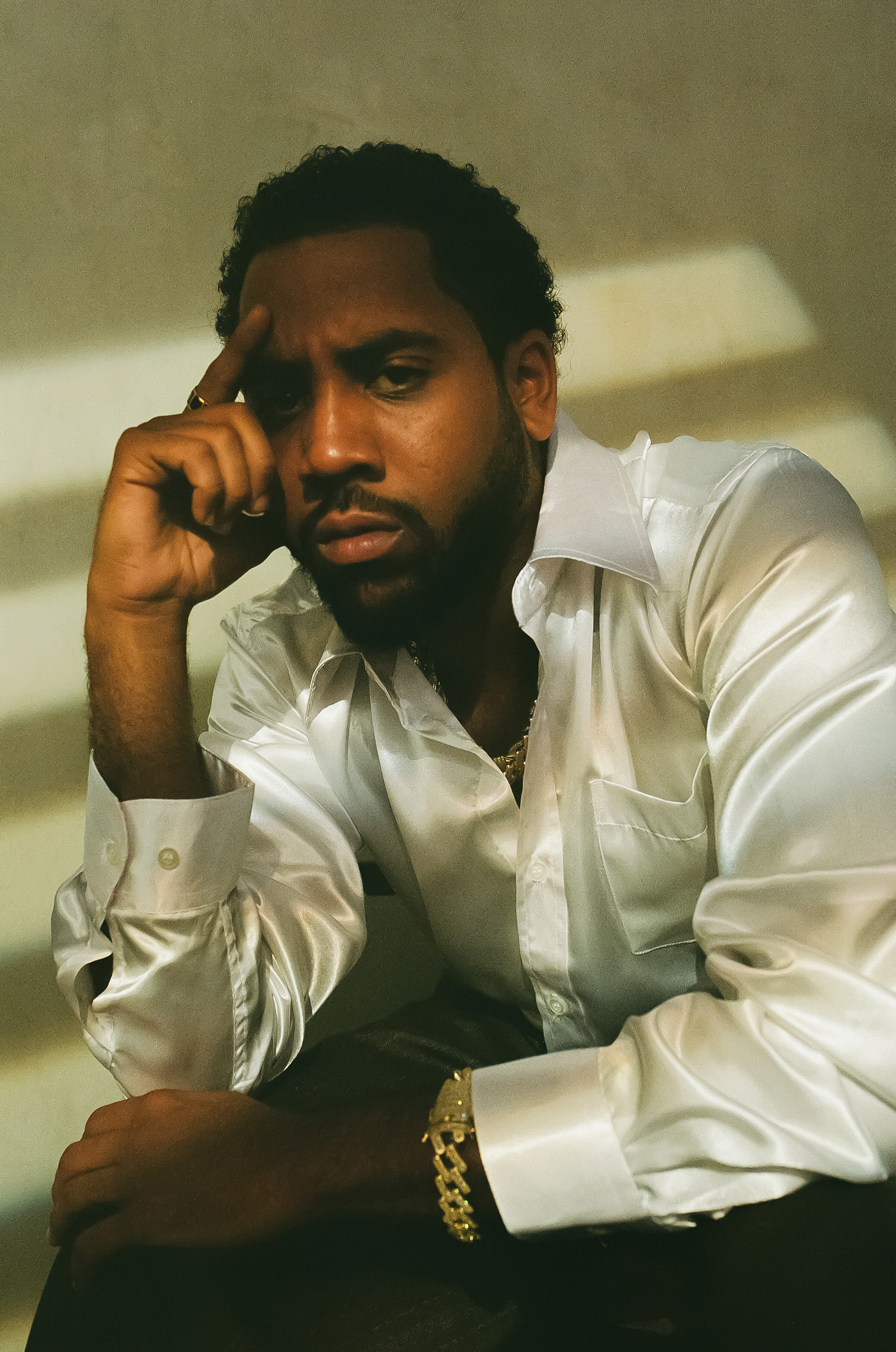
Jharrel Jerome has had a good year. He joined the Marvelverse, voicing Miles G. Morales in Spider-Man: Across the Spider-Verse. He starred as Cootie, a 13-foot-tall teenager, in Boots Riley’s first television show, I’m a Virgo. He played the impulsive Aked in the Steven Soderbergh-directed series Full Circle. And he is making a name for himself in the music industry, too: since the end of August, he’s been releasing “packs”: sets of four songs—rap, trap, R&B, and trippy—that will add up to a 16-track project, Someone I’m Not.
Jerome, who is Dominican and Haitian, is perhaps best known for his work on the 2016 movie Moonlight and the 2019 show When They See Us, for which he won the Best Actor Emmy. At 26, he has already built an impressive career by being intentional about the roles he picks. “My goal is to be meticulous and to make sure that the next project is just as challenging and just as weird,” he says. “That’s not an easy thing to do, and especially as an actor of color: That’s even harder to do because roles for us don’t come every day, especially roles with such impact and such gravitas.”
Coming up next, Jerome’s character in Spider-Man is slated to play a major role in the final installment in the trilogy, though it was delayed due to the writers’ and actors’ strikes, and a new release date has not yet been announced.Jerome says he aspires to be patient, diligent, and tireless as an artist, like fellow multi-hyphenate creative Donald Glover. He hopes his work portrays “the idea of no limitations and the idea that you could be from the hood, you could have darker skin, and you can still be allowed to do whatever you wanted to do, as long as you’re focused enough,” he says. “I don’t ever want to come off as the guy who does whatever just to do it. I want to come off as the guy who challenges himself, who does the hard work.” –Laura Zornosa
Maria Teresa Kumar

Latinos may be the sleeping giant of American politics, and as founding president and CEO of Voto Latino, Maria Teresa Kumar is laser-focused on how to make their voices heard in government.
Kumar, 49, emigrated from Colombia as a child when her mother accompanied Kumar’s American stepfather to the U.S. for medical treatment and moved in with his family in Sonoma County, Calif. “When my grandparents saw my mother, the only interaction they had ever [had] really with a brown woman was the field hands,” she recalls. So while her father was convalescing, “they sent my mother to work in the fields. And I share that, because that was the first time I became political.” Kumar worked on Capitol Hill and attended Harvard’s Kennedy School of Government before deciding she wanted to devote her career to empowering and registering Latino voters. “Young children, before they turn 18 years old, are navigating America, both in the spaces of the broader society, but also internally at home on behalf of their parents and their families,” she says. “My journey has always been navigating these two worlds, representing my family, but also trying to translate to the broader community who we are.”
Kumar joined Voto Latino in 2004 to mobilize that rising population of voters. “Oftentimes when people do politics, they basically say, ‘Well, how many voters do we have today?’” she said. “The way we did Voto Latino is, I identified the states where Latinos could have been only 3% to 4% of the population to vote, but they were at least 15 to 20% of the classrooms.” While Voto Latino is a national organization, it focuses on the states with big populations of young Latinos who are poised to grow into a powerful voting bloc, like Nevada, Arizona, and Georgia; every 30 seconds, she says, a Latino person in the U.S. turns 18.
Though it isn’t aligned with a political party, Voto Latino, which by 2016 had collected 177,000 voter registrations, tends to endorse Democratic candidates. But when Trump was elected on a wave of anti-immigrant rhetoric, Kumar knew she had to redouble the group’s outreach efforts. Over the course of the Trump presidency, she says, it registered more than 1 million young voters.Latinos are now the country’s second-biggest voting bloc, but with polls showing that some Latino voters may be drifting toward Republicans, Kumar and her team are taking all the strategies they’ve tried in previous elections—from celebrity appearances to social media campaigns to digital organizing—and putting them together for 2024. They aim to register half a million voters ahead of the presidential election. “We are on the precipice of massive change,” Kumar says. –Charlotte Alter
Frank Ray
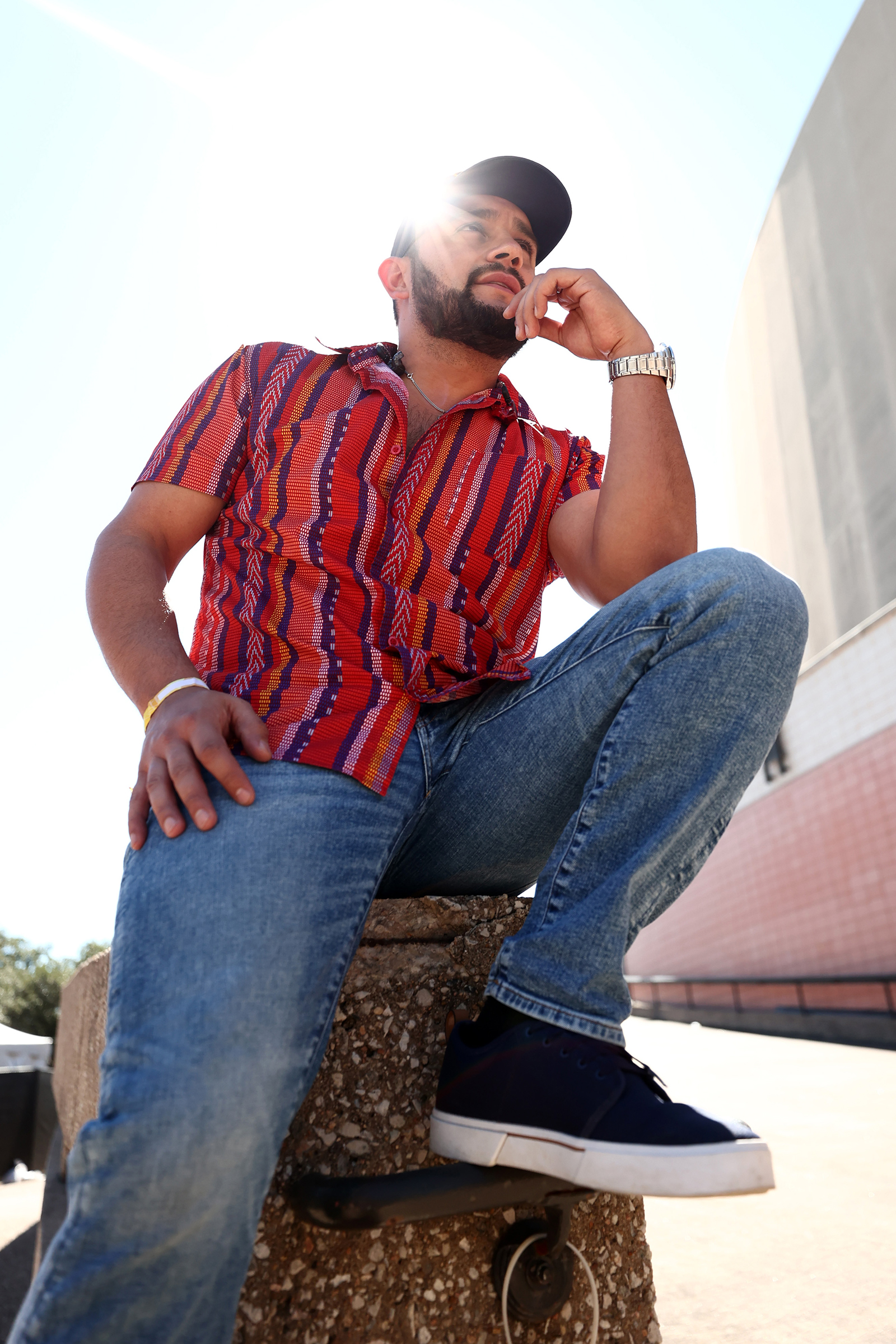
The southern border of the United States has long influenced the music of Francisco Gomez, known professionally as Frank Ray. When he served as a police officer for a decade in his home state of New Mexico, Ray would sing at local venues with his cousin and two friends in their band Border Avenue. As the group garnered greater attention, he left the force to pursue music full-time, emerging as a rising star among a new generation of Latino artists who are unapologetically embracing their roots and expanding what the mainstream country genre looks and sounds like.
“Had I not grown up so close to the border, I might not have been exposed to that part of my culture, which is something that has shaped me as a man and as an artist,” says Ray, 36. “I was always surrounded by the culture, always surrounded by different music, whether it was mariachi, Tejano music, cumbia, rancheras, and of course country music.”
Ray released his first EP, Different Kind of Country, in 2017 and his self-titled debut album in 2021, from which multiple songs landed on U.S. country charts. And in September, he released an EP, titled Raíces (Así Se Hace), of Spanish-language covers of several of his hit songs.
Throughout his career, Ray has used his platform to shine a light on issues that matter to him. He launched a nationwide campaign earlier this year to support the mental health of first responders. And both in and out of his music, he’s pushed back on political demagoguery against immigrants and Latinos. His latest single, “Jesus at the Taco Truck,” a collaboration with singer-songwriter and producer Shy Carter, is a lyrical tribute to a character who crossed the Rio Grande to work in Texas in order to support his family in Mexico.“This music genre isn’t known for its Latin representation,” he says. “I think the most important part of being an artist today is how I’m able to provide a voice to people who are from my culture that love country music.” –Moises Mendez II
Carla Vernón
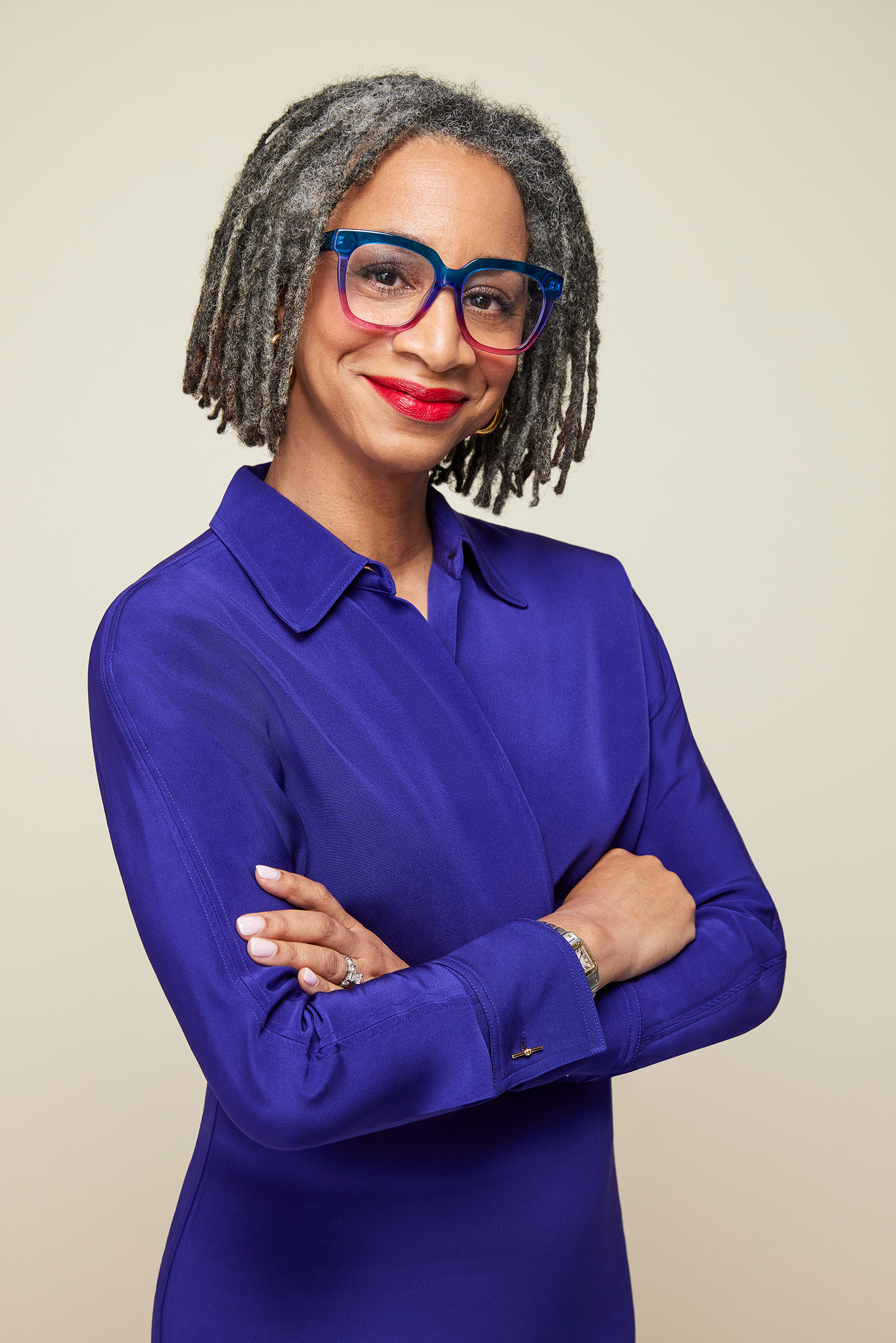
Carla Vernón, CEO of The Honest Company, did not always see herself going into business. Her lifelong quest—inspired by her two Ph.D.-achieving parents (her mom Cynthia is a NASA Hidden Figure)—was to make the world a better place. At first, Vernón, whose father immigrated from Panama to attend college in the U.S., pursued that through a degree in ecology from Princeton and stints at The Nature Conservancy and as a Senate staffer. She says her path to the private sector was inspired by personal mentors, including former Sen. Carol Moseley Braun and former First Lady Michelle Obama, who showed her that there was room in any industry for Black and brown leaders to make a difference. She then spent more than two decades rising to executive positions at General Mills and Amazon.
“I’ve always been confident that I like to help others do things that are big-impact,” says Vernón, 53. Vernón’s newest role—as the first Afro-Latina CEO of a publicly traded company—means helping actress and fellow mother Jessica Alba, who co-founded Honest with the goal of sourcing clean, naturally derived products for women and infants. It’s a mission that immediately appealed to Vernón. Honest was “built by people who the largest consumer-products companies are trying to serve, but who aren’t necessarily in the leadership seat,” she says, and helming such a company comes with a unique power to see needs that may have previously been ignored.Following a slump after early-pandemic demand subsided, Honest has seen record-breaking revenues since Vernón took charge at the start of the year. “When I came to Honest,” she says, “I wanted to build the company I always would have wanted to work for.” –Haley Weiss
Eva Longoria

As a child growing up in South Texas, Eva Longoria noticed that most of the movies and books she encountered bore little resemblance to her own experiences. She knew even back then that she wanted to uplift the Latino community through storytelling, but she was navigating the complexities of her own identity and didn’t really have a model. “I straddled the heights of what it means to be Mexican American,” Longoria, 48, says. “Growing up, I almost felt like I wasn’t from anywhere.”
When she moved to Los Angeles in the ’90s, she realized the entertainment industry had a rigid idea of what Latinas should look and sound like. Producers would often rely on old tropes and tell her that her accent wasn’t Spanish enough for her to be cast as Latina. It wasn’t until 2004, when she starred as Gaby Solis in Desperate Housewives, that she finally had her breakthrough. The show’s enormous success, spanning eight seasons, made Longoria a household name. But it was also what prompted her to think beyond delivering lines written by others.
This year, she made her directorial debut with Flamin’ Hot, a biopic about the story of a former janitor at Frito-Lay who made an indelible mark on the company by pitching the idea of Flamin’ Hot Cheetos. His journey resonated with Longoria, and she assembled a predominantly Latino team to bring the film to life. “Hollywood defines what a hero looks like, and I wanted to take the reins of that and say a hero looks like Richard Montañez,” she says. That isn’t her only recent project elevating Latino stories: her six-part docuseries Searching for Mexico, in which she traveled across Mexico exploring the country’s cuisine, premiered in March. She also runs her own foundation to help Latinas build better futures for themselves and their families through education and entrepreneurship, and in 2014, she co-founded the Latino Victory Fund, a political action committee to boost Latino political participation and raise money for candidates. “I’ve gotten some pushback for my political advocacy,” she says, “but these issues are way more important to me than how much box office I would get at a movie theater.”
Still, even with her success, she knows better than to get complacent. “We don’t get a lot of bites at the apple,” Longoria says of being a Latina working in Hollywood. “We have so much pressure to succeed on so many levels with every project that we do, because if one fails, then it’s going to be a long time until they make another one.” –Nik Popli
Cesar Conde
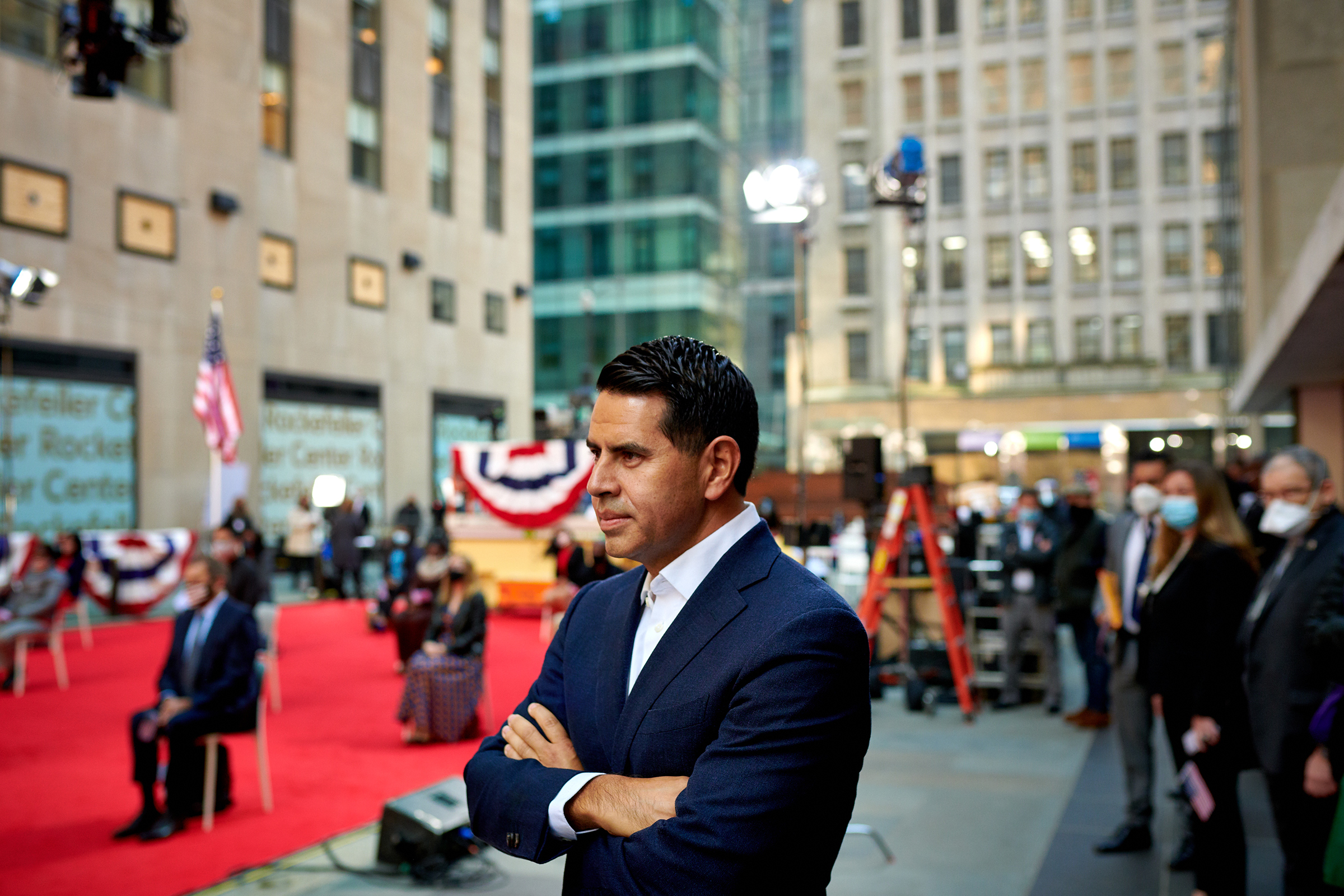
On any given week, you’ve likely watched something Cesar Conde has touched. Conde, 49, runs NBCUniversal News Group, the most viewed news organization in the United States. The businesses Conde oversees—NBC News, MSNBC, NBC’s streaming service NBC News Now, the business channel CNBC, 43 local stations, and Telemundo’s many Spanish-language broadcast businesses—reach 2 in 3 American adults, including 95% of Hispanic TV households in the U.S.
Conde grew up in Miami and South Florida surrounded by the sounds of his mother’s Cuban-accented Spanish and eating ceviche and quinoa dishes inspired by his father’s childhood in Peru. Given that we live in such an interconnected time, being able “to walk in different worlds and speak different languages and cross different cultures, I do think is a superpower,” Conde says.
Early in his career, Conde worked for an Internet startup and an investment bank, before joining Secretary of State Colin L. Powell’s office as a White House fellow in the early 2000s. The two clicked. Powell encouraged Conde to work in a business that also provided a public service to his community, like Hispanic media. Conde did, eventually rising to be the president of Univision Networks before joining NBCUniversal in 2013.
Under Conde’s watch, MSNBC has passed CNN in ratings and is closing the gap with Fox News, NBC News Now built a profitable news streaming service where others have faltered, and the Today show has expanded its lead as the No. 1 weekday morning program on TV. He’s done that while launching an effort to bring in more diverse voices and educate the next generation of news leaders, which he says is key to the broadcaster’s future. “At the end of the day, this is not just the right thing to do,” says Conde, “it’s the right thing to do for our business.” –Brian Bennett
Sol Trujillo
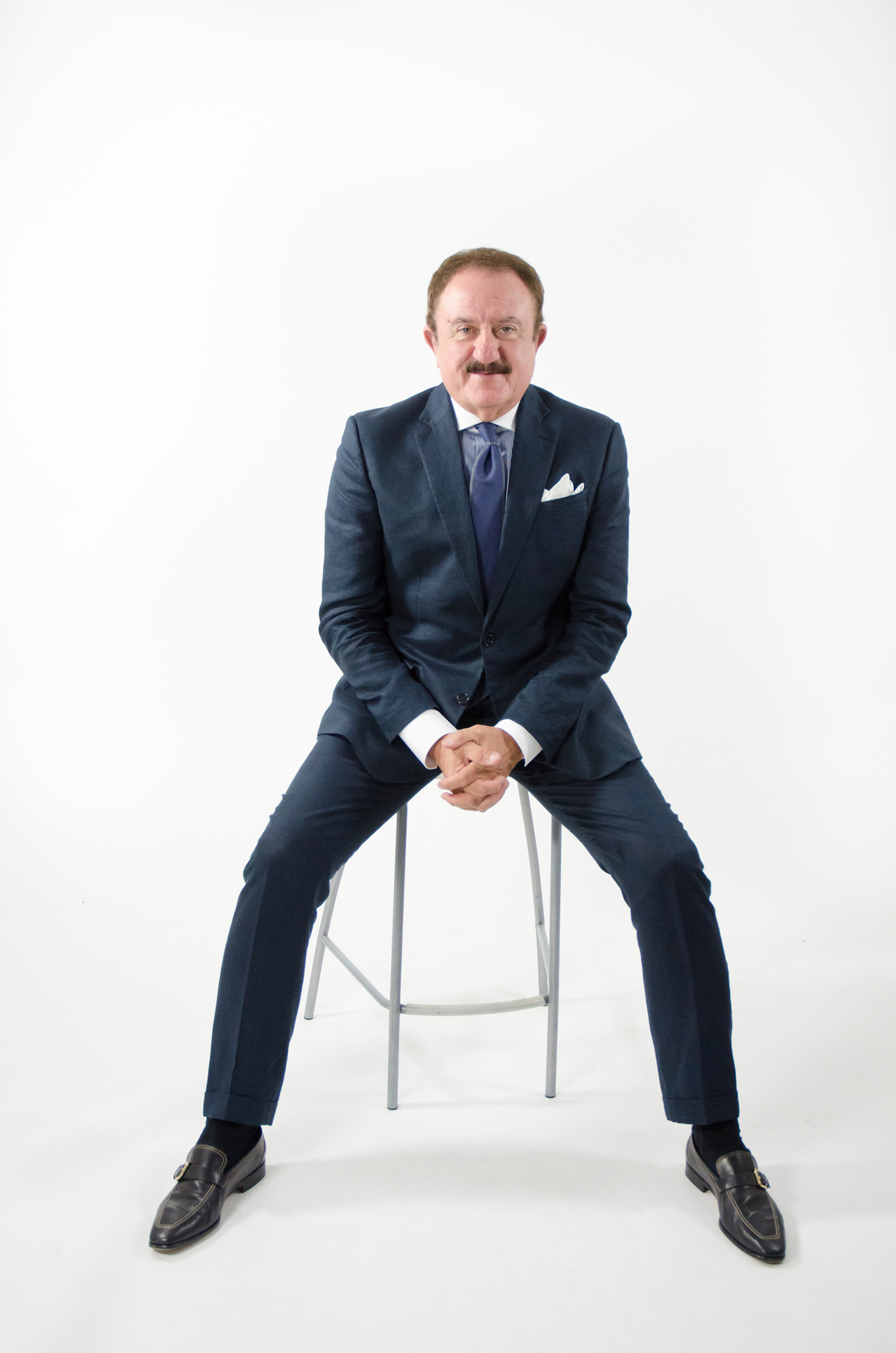
Without Latinos, says business executive Sol Trujillo, the U.S. might look a lot like Japan—an aging society with little opportunity for economic or population growth. Instead, he says, Latinos are helping the U.S. add people, jobs, and businesses. It’s one reason that Trujillo founded, in 2010, the Latino Donor Collaborative, a nonprofit that seeks to reshape the nation’s perception of Latinos.
Trujillo, 71, returned to the U.S. in 2009 after working abroad and says he was taken aback by the many negative portrayals of Latinos in American culture. What Americans should realize, he says, is that many countries in Europe and Asia “don’t have a growth cohort inside their economy. We have one, and it’s called the Latino cohort,” he says. “But what are we doing to stimulate it? The answer is basically nothing.”
In 2019, Trujillo attempted to remedy this by launching L’Attitude Ventures, a venture-capital firm that invests exclusively in Latino-run businesses. Trujillo, who traces his roots in America back 500 years, also launched L’Attitude, an annual conference that celebrates the potential of Latinos in the U.S. economy.
Trujillo has been instrumental in gathering data that proves how big a role Latinos play in the U.S. economy—$2.8 trillion in economic output, according to the most recent report from the Latino Donor Collaborative—and he’s determined to put those numbers to use. He’s pushing for companies to put more Latinos on boards and in senior management positions, and for more venture capitalists to invest in Latino-led businesses. “If we want to stay ahead of China, the No. 1 economy in the world, this is our silver bullet,” he says. –Alana Semuels
Laith Ashley
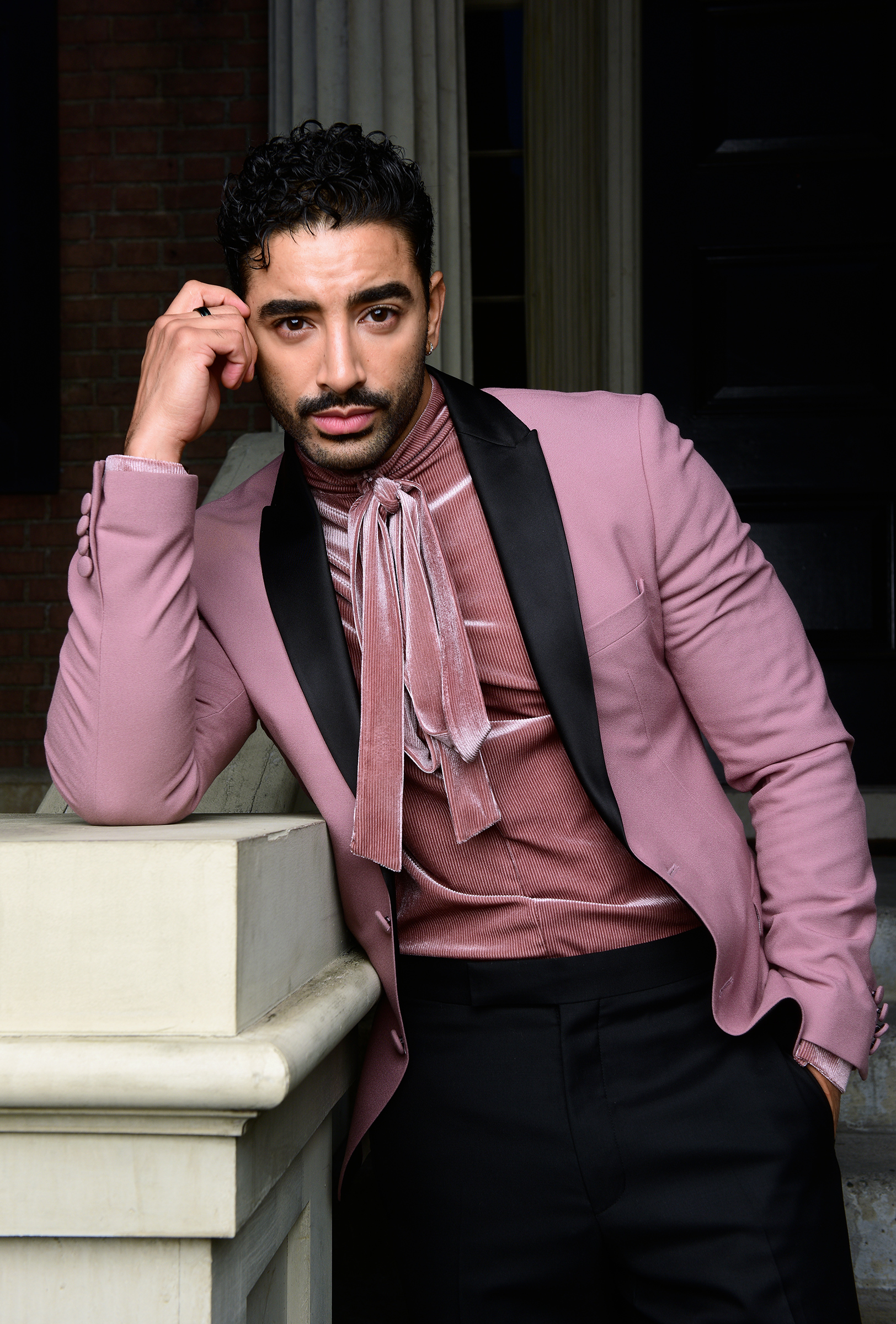
Before becoming a model, singer, and actor, Laith Ashley was a social worker for homeless LGBTQ+ youth at the Callen-Lorde Community Health Center in New York City. A Dominican American from Harlem, New York, he came out as transgender in 2013, and after photos he posted on Instagram went viral in 2015, a newfound career took off. He was one of the first openly transgender male models to appear in a national fashion campaign (for Barneys in 2014), the first openly transgender man to be featured in a Diesel campaign (photographed by David LaChapelle in 2018), and the first transgender member of the pit crew on RuPaul’s Drag Race. He’s also appeared in magazines from Vogue France to British GQ as well as music videos by the likes of Kim Petras and Icona Pop.
But it hasn’t been easy. Ashley, now 34, proudly defies stereotypes, refusing to conform to a casting director’s image of who he should be. “In their mind, Latine looks a particular way,” he says. “if you don’t fit that box of what they think it looks like, then that becomes difficult.”
Ashley appeared earlier this year as Taylor Swift’s love interest in her “Lavender Haze” music video. Such an opportunity has made the careers of other models. But for Ashley, the experience, which he says he is grateful for, coincided with a wave of anti-trans sentiment and legislation across the United States. Brands like Bud Light and Target have faced pointed backlash for working with or supporting the LGBTQ+ community. “Usually, the time of year when I make most of my income is during Pride [month],” he says, but this year, “I made nothing.”
Still, Ashley says he won’t stop working on his craft. In particular, he hopes that a show he worked on called Unconventional—a comedy series that had trouble finding a home reportedly because streamers were concerned with its many LGBTQ+ characters and themes—will eventually be released somewhere. If people can see that show, Ashley says, they will be able to “see me.” –Moises Mendez II
Elizabeth Acevedo

Elizabeth Acevedo’s love of storytelling started decades before she became a bestselling author and the Young People’s Poet Laureate. It began in the classroom, during her time as a student and later on as an English teacher, where she grasped the significance of having Latino representation in literature.
“I read anything and everything put in front of me, but it was different when I read a book about someone who was from a city, from a big family, trying to navigate gender, race, and language, because there was an affirmation of who I was in those books,” says Acevedo, 35, a Dominican American raised in New York City. She decided she could contribute to that canon: “I had to face the questions of inaccuracy I had around who is allowed to write a book and thought, ‘Why not me?’”
More From TIME
Acevedo has since published three notable young-adult novels: The Poet X, which won the National Book Award for Young People’s Literature in 2018, With the Fire on High a year later, and 2020’s Clap When You Land, which has been tapped by the production company Made Up Stories for a television adaptation with Acevedo as a screenwriter. Her latest novel Family Lore, Acevedo’s first for adults, explores the dynamics between women in a Dominican American family. Acevedo says all her books “stretch the ability of language” to illustrate the intricacies of family, justice, and womanhood within Latinidad. “If a book was a gala, I’m honoring and giving flowers to hood morenitas from all over the world,” she says.
More than the acclaim she’s received, Acevedo says she finds it most gratifying when readers tell her they’ve shared her books with their family members and had intergenerational conversations after reading them. “You don’t receive a prize for that,” she says, “but it is the most moving testament to what I hope my work can do.” –Mariah Espada
Willy Chavarria
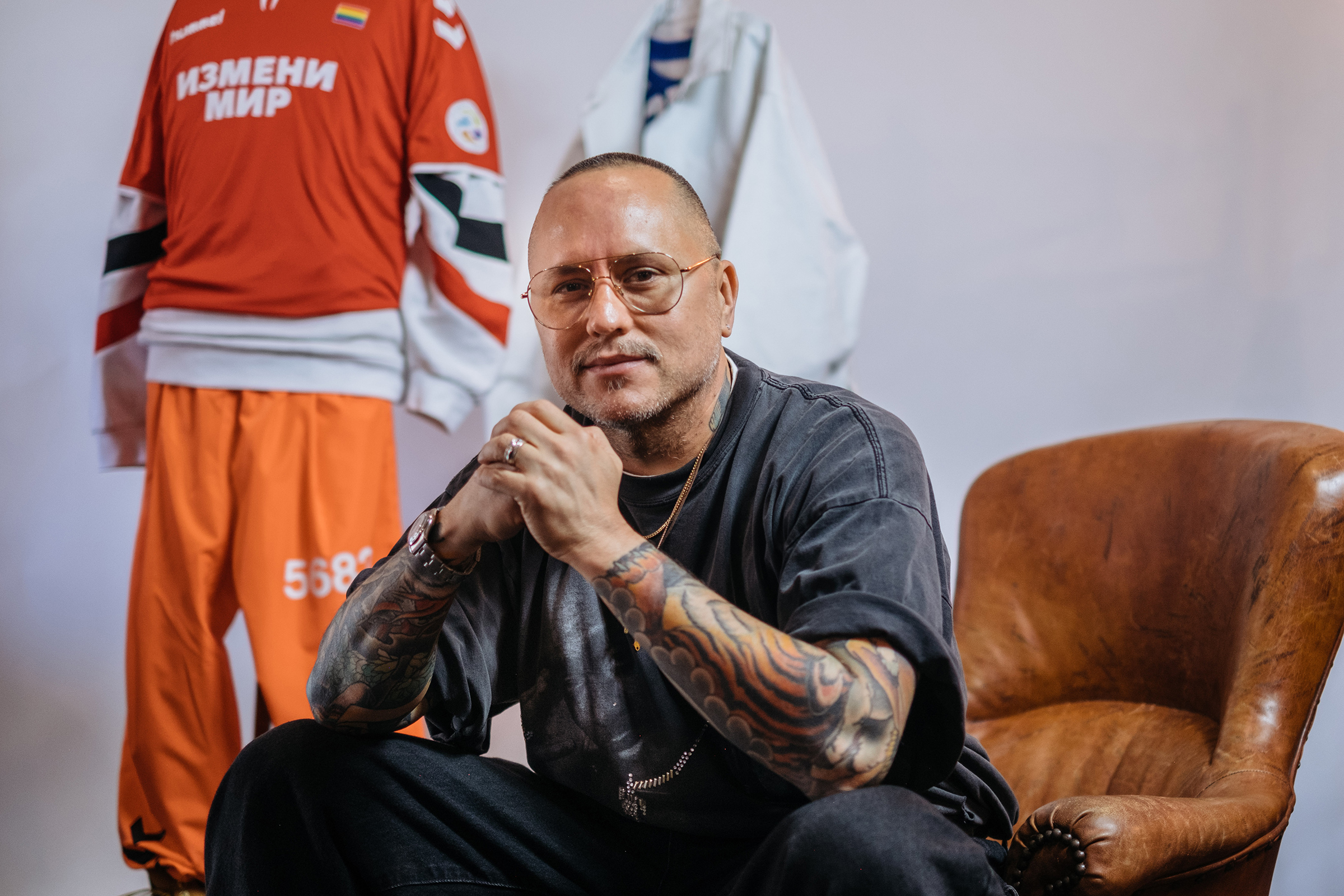
At the heart of Willy Chavarria’s designs is a radical celebration of authenticity. The 56-year-old fashion designer, who’s also a senior vice president of menswear at Calvin Klein, founded his eponymous label in 2015, with a hunger for beauty in all forms and a refusal to water down his politics to appeal to the industry. “That was the first thing I talked about with my team,” Chavarria says. “We are a brand that is political and stands up for justice and human dignity—that will always be a part of our ethos.”
Chavarria began his career in fashion nearly three decades ago working in the stockroom of Joe Boxer as a college student, before moving into a design role at the company; later, he did stints at brands including Ralph Lauren and American Eagle. He attributes his convictions to his experiences moving through the world as a queer Chicano man and to growing up in a politically active, working-class Mexican family in a small town in California’s Central Valley.
His commitment to delivering fashion with a message has taken many forms: sharply tailored suiting, voluminous silhouettes, and subversive workwear that challenge conventions around gender and sexuality; runway shows that bring issues like immigration to the forefront, like his spring/summer 2019 collection, which began with the spoken prompt, “Have you ever seen a human in a cage?”; and castings that show a more expansive view of beauty by centering models of color and selecting real people, from his friends to strangers on the street, to appear alongside professionals.
Chavarria’s values as much as his innovative designs have made him stand out in the fashion world, but he hopes his success is indicative of a bigger shift for the industry. “I think the fashion industry is very much ready for change,” he says. “I would love to see a more authentic connection with people, a more positive approach to inclusion, and a way to show that we can be elegant and gorgeous and still be kind and sensitive.” –Cady Lang
Robin Arzón

Robin Arzón never expected to become one of the most influential figures in the fitness world. A near-death experience in a hostage situation during college led her to take up running as she tried to cope with the trauma, but health and exercise were not initially her career focus. She worked for seven years as a corporate attorney in New York City but in 2012 left her job to coach people on how to bike, run, lift weights, and move their bodies. Today as the head instructor of Peloton, she’s one of the most recognizable faces at the company. She’s also written a memoir and hosted a MasterClass on mental strength.
Her reach expanded even further in 2021 when Peloton decided to launch classes in Spanish, an initiative in which Arzón, daughter of a Cuban mother and Puerto Rican father, played a major role. “Our communities need movement,” she says, emphasizing the importance of Peloton’s cycling rides that highlight Spanish-language musical artists.
Arzón, 42, is currently on maternity leave with her second child but keeping busy. In addition to running her membership club, Swagger Society, she is publishing another book this September, a journal with motivational quotes and goal-setting frameworks titled Welcome, Hustler. She recorded classes for Peloton throughout both her pregnancies and has made motherhood and passing on the traditions of her forebears a central part of her brand. Last year, she published a children’s book called Strong Mama, and this summer, she launched a bilingual toyline, Bebé Fuerte, that encourages age-appropriate movement for children with phrases in both English and Spanish.
“I carry my mother’s story as a Cuban refugee and my father’s Boricua legacy with me,” she says. “As a mother, I plan to pass on the history, rich with tenacity.” She adds: “The energy of a thousand abuelas are with me.” –Eliana Dockterman
Miguel Cardona
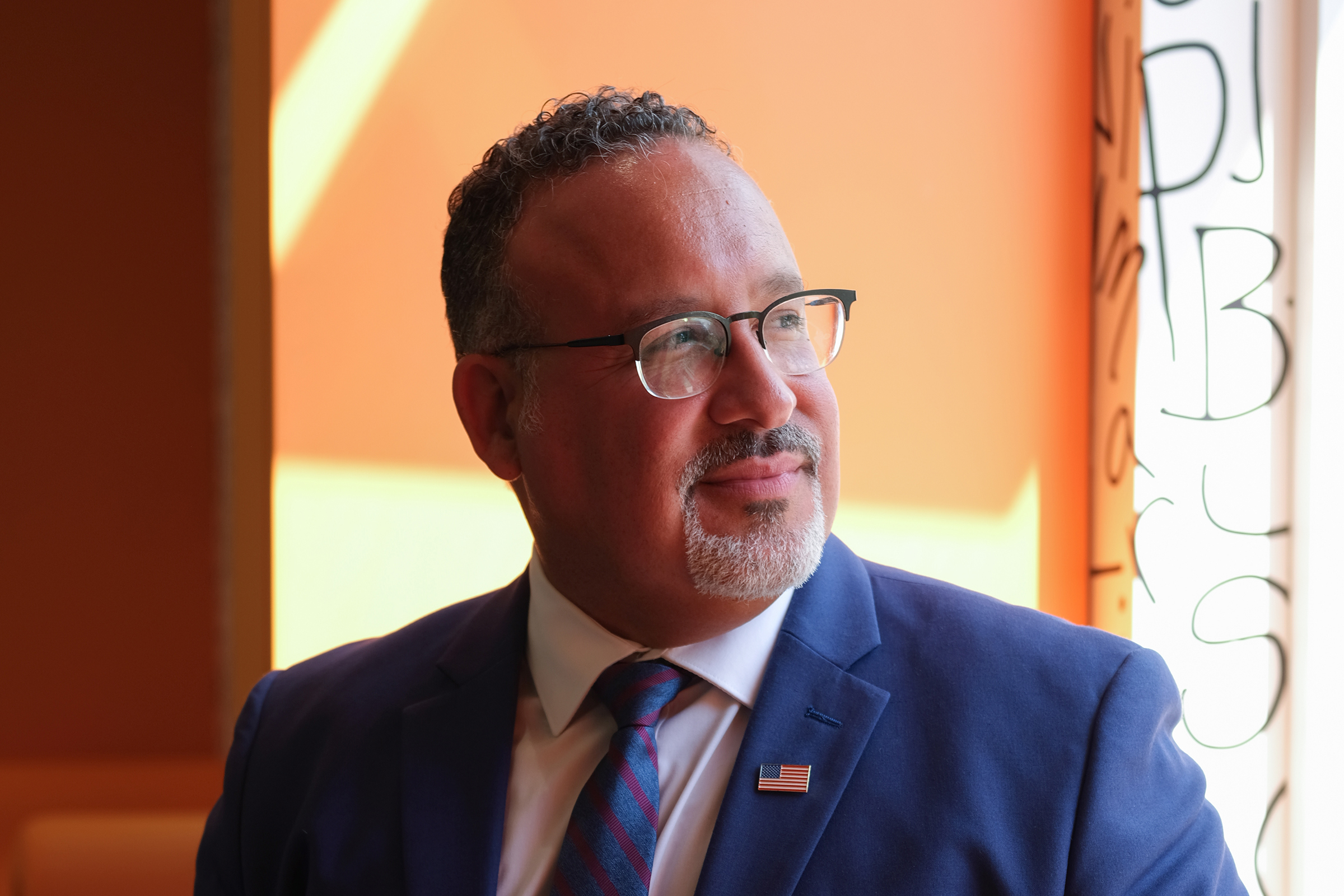
As the Secretary of Education, Miguel Cardona oversees a department that provides guidance for roughly 65 million students nationwide, from pre-K to adult learners.
Ever since he joined the Cabinet in March 2021, he has been faced with a series of historic challenges, from how to safely return to in-person teaching after the unprecedented disruption caused by the COVID-19 pandemic, to advising colleges and universities on how to legally recruit diverse student bodies after the U.S. Supreme Court struck down race-conscious admissions policies at Harvard University and the University of North Carolina at Chapel Hill last summer. This October, millions of federal student loan borrowers must resume payments for the first time in three years, and Cardona is focused on getting them enrolled in an income-driven repayment program that could cut what they owe on undergraduate loans in half.
The grandson of a sugarcane farmer from Puerto Rico, Cardona, 48, grew up in a bilingual household in Meriden, Conn., and he says he has a special affinity for students who may have been underestimated because their English wasn’t as strong as their native tongue. He’s especially focused on closing racial achievement gaps and making sure schools have the resources to support multilingual students so that they can compete in the global economy.
“There are so many students with the same potential that I had that oftentimes may be overlooked in our schools,” Cardona says. “I know that across America we have students with tremendous potential, as long as people believe in them. People believed in me in my community, so I want to make sure that the same is true in all communities in our country.” –Olivia B. Waxman
Gloria Calderón Kellett
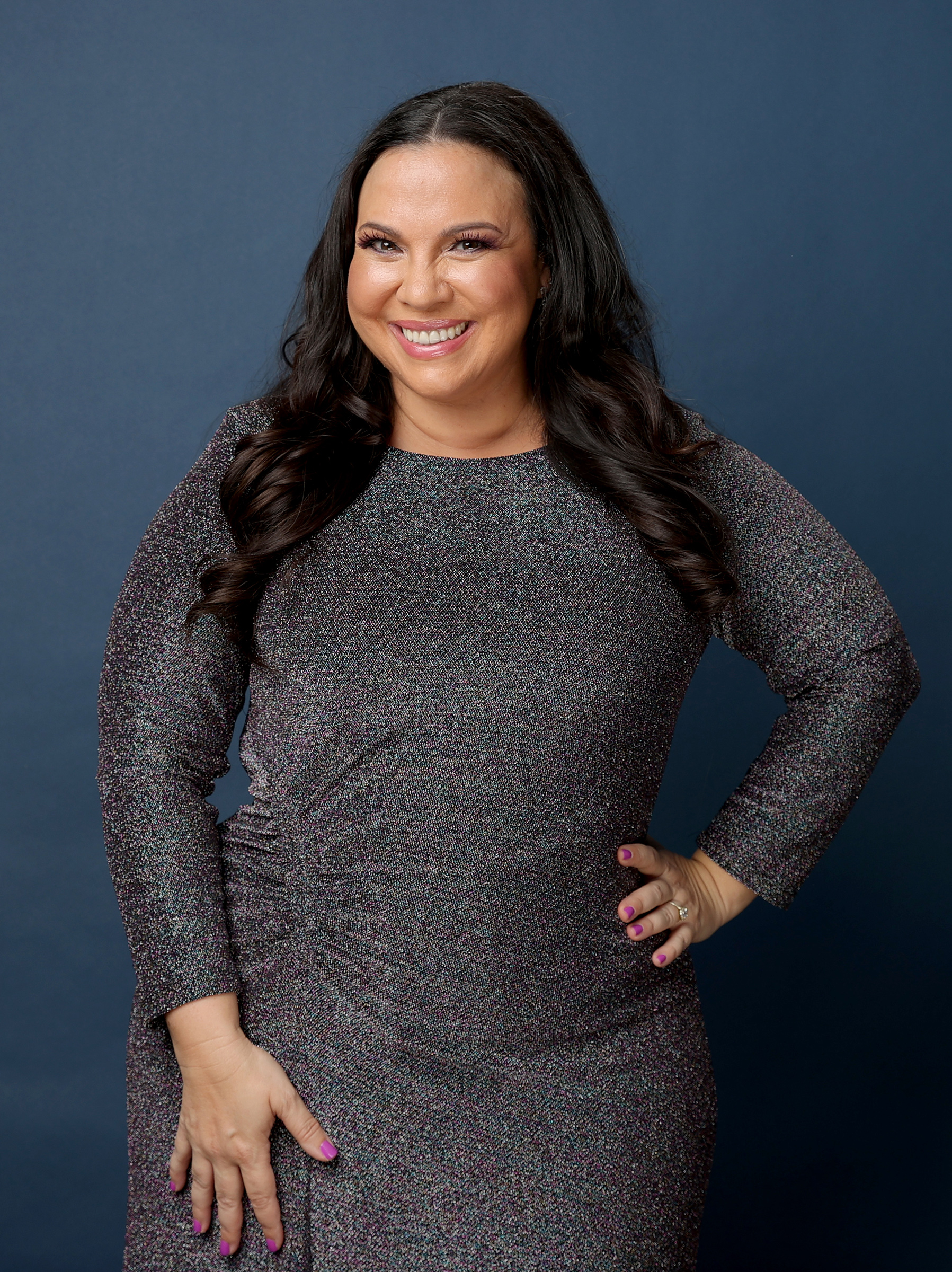
Gloria Calderón Kellett’s creative ambitions have always gone far beyond mere representation. The 48-year-old showrunner, producer, writer, director, and actor has devoted her career to expanding not just the number but also the variety of stories Hollywood tells about the Latino community. “We are still in a pretty dire state of erasure,” Calderón Kellett says. “So, for me, the fix to that is: put us everywhere. Because we are everywhere.”
After getting her start as a screenwriter on shows like How I Met Your Mother and Devious Maids, Calderón Kellett, the daughter of Cuban immigrants, co-created an acclaimed reboot of Norman Lear’s 1970s sitcom One Day at a Time, this time centering on a multigenerational Cuban American family. Since that series wrapped in 2020 after four critically acclaimed seasons, Calderón Kellett has become remarkably prolific. Along with creating With Love, a rom-com series that spotlights lovers of all ages and sexualities, and executive producing gory gentrification satire The Horror of Dolores Roach, Calderón Kellett has multiple feature film projects in development and a play slated to debut at Pasadena Playhouse in early 2024. In January, she was appointed to the Television Academy’s Executive Committee.
Yet Calderón Kellett isn’t letting success make her complacent. If anything, she’s become more vocal than ever about the political power of storytelling. A member of both the WGA and SAG-AFTRA, she sounded off on a picket line in August about the crucial need for solidarity among Latino artists: “Policymaking starts by what people see in Hollywood.”
And she isn’t just speaking out—she’s doing real work to make change in the entertainment industry. Calderón Kellett also chairs the arts nonprofit Creative Coalition’s Diversity Gap Initiative, which subsidizes the living expenses of new hires in the entertainment industry who come from low-income backgrounds. “The advocacy goes hand in hand with the work that I do,” she explains. “The reason I’m a storyteller is because I didn’t see myself [in pop culture]. And so I want other people to not feel that they’re invisible.” –Judy Berman
Julio Rodríguez

Julio Rodríguez’s numbers are reason enough to declare him the future of baseball. In September, the Seattle Mariners center fielder, who grew up in the Dominican Republic, became just the fourth player age 22 or younger to join the 30-30 club—30 or more home runs and stolen bases in the same season. During his relentless August, “J-Rod” broke the MLB record for most hits in a four-game span, with 17. In his 2022 rookie campaign, Rodríguez became the first player in major league history with 15 or more home runs, 50 or more RBIs, and 20 or more stolen bases in his first 90 career games. According to one advanced datapoint on power and production, Rodríguez joined Mike Trout, Albert Pujols, and Ted Williams as the best rookie position players ever. It’s no wonder that, in August 2022, Seattle gave Rodríguez a massive contract extension, worth at least $210 million over a dozen years.
What may be more important than J-Rod’s stats, however, is his personality. Baseball needs marketable stars. Rodríguez shines with a smile on his face and engages with fans at the stadium and through social media. “It’s really important for me to show that you’ve got to have fun in this game,” says Rodríguez, 22. “If you take it too seriously, you’re not really sending a good message to people. I’m always spreading positivity.”
Rodríguez helped the Mariners end a 21-year playoff drought in 2022; Seattle is fighting for postseason position down the home stretch this year. The Mariners, who entered the majors as an expansion team in 1977, are the only existing baseball franchise to never reach a World Series. Long-suffering Mariners fans, Rodríguez says, “should know that we’re always going to put in the work. We’re always going to be fighting for them. Because that’s what they deserve.”
With J-Rod roaming center field, the payoff should be sweet. –Sean Gregory
Erik Ramirez

Erik Ramirez discovered his passion for cooking as a teenager during a summer with his uncle in Grand Isle, La., a remote town on the edge of the Gulf of Mexico. By day, Ramirez would work at a local supermarket, while evenings were spent in the kitchen, where the two would try to prepare food from a range of backgrounds and styles.
“He wasn’t a chef, but he really enjoyed cooking,” Ramirez says of his uncle. “He made it fun.”
Ramirez, now 42, went on to get a culinary education at the Art Institute of Philadelphia, then worked his way up through the kitchens of some of the top-rated restaurants in the world, before opening his own in Brooklyn. He was among the chefs to serve the stars at the 2021 Met Gala and was a finalist for the James Beard Outstanding Chef Award in 2023. Today, he has two restaurants in New York City (and another on the way), one in Madrid, and one in London.
Born in New Jersey to Peruvian parents with Japanese and Italian ancestry, Ramirez has tailored his menus around his own cosmopolitan cultural heritage. His flagship restaurant, Llama Inn, serves Peruvian-inspired fare infused with flavors, ingredients, and techniques from across the globe, such as lomo saltado, a traditional Peruvian dish, served with Chinese crepes and chiles on the side.
That the concept would attract critical acclaim was hardly a given, says Ramirez, who had grown used to seeing such praise reserved for chefs at European or New American restaurants. “I had never looked at Peruvian cuisine as something that I wanted to cook, because I always had this idea of it being homey, traditional.” Now, however, he’s determined to help it be taken more seriously in the culinary world—“to show,” he says, “that it belongs among the best of the best.” –Solcyre Burga
Dolores Huerta

Dolores Huerta is a civil rights icon who has spent her life championing better working conditions for laborers.
“The working people, these are the fabric of the country,” Huerta, 93, says. “And if they cannot afford to feed their families, then that reflects on the whole economy.”
Huerta, who is Mexican American, was born in the mining town of Dawson, N.M. Her activism career began in 1955 when she founded a chapter of the Community Service Organization, which led voter-registration drives. She then co-founded the United Farm Workers Association (UFW), alongside her longtime collaborator Cesar Chavez.
In 1965, Huerta stood beside striking grape-farm workers as growers tried to run them over with cars and pointed rifles at them. She was the lead negotiator in the contract they secured that included provisions eliminating harmful pesticides, allowing for rest periods, and securing access to drinking water and toilets in the field.
While at UFW, Dolores helped usher in an immigration law that legalized most undocumented immigrants who arrived in the U.S. before 1982. “That act helped thousands of people get their immigration status in the United States of America,” she says.
Her famous slogan, “Si, se puede”—Spanish for “Yes, we can”—has lived on beyond its original intent, which was to quell concerns that workers in Arizona could not strike because a state law could send them to prison. It’s now a rallying cry for progressive change—one commandeered by Barack Obama’s 2008 presidential campaign. When she met President Obama for the first time after he was elected, he thanked her for letting him steal her slogan. That was “pretty awesome,” she says.
Huerta received the Presidential Medal of Freedom in 2012. Now, through the Dolores Huerta Foundation, she is focused on increasing access to voting and training young political organizers. “When we look at all of the movements that have changed things in our country,” she says, “it’s always been young people.” –Sanya Mansoor
More Must-Reads from TIME
- Cybersecurity Experts Are Sounding the Alarm on DOGE
- Meet the 2025 Women of the Year
- The Harsh Truth About Disability Inclusion
- Why Do More Young Adults Have Cancer?
- Colman Domingo Leads With Radical Love
- How to Get Better at Doing Things Alone
- Michelle Zauner Stares Down the Darkness
Contact us at letters@time.com
